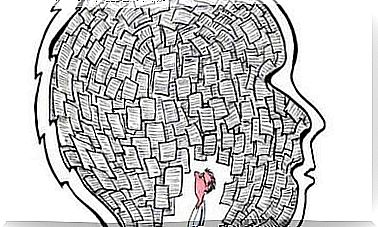People Who Think That Others Are Responsible For Their Problems

“Somebody always does something so that I have to fail in my project!” This statement applies to those who are convinced that the others are responsible for their problems. Do these sensations sound familiar to you? Do you recognize yourself or someone close to you in them?
There are many people who are unable to take responsibility for what they do. It is difficult for them to take the initiative and the wheel of their lives because they cannot accept that they are actually the person who directs their life, who makes the decisions and acts. In the scenarios they design, there is always someone guilty of what happens to them. And of course they are not themselves.
It is the fault of my friend, my mother, the person I met … There is a wide range of culprits, as wide as we want them to be. Our greatest blindness is our inability to accept the role we have in the face of our circumstances. It is a role that luckily falls to us and no one else, including fate. We gain nothing if we deny it.
Projecting the responsibility outward so as not to have to accept it
Some people are true artists at distorting reality in order to justify what they say to themselves. Namely, that they are not responsible for what happened to them. They are okay with their self-delusion, in part because they are so used to it that it happens unconsciously. Yet it remains a limitation, something that obscures its reality, makes it look more chaotic and hostile.
We lose our pole star when we lay our responsibility on the shoulders of others. When we act impulsively and are frustrated because someone isn’t responding the way we’d like them to. That someone can’t or won’t do that, but this is not our fight. He can do what he wants. We are the ones who have to act accordingly.

These people waste a lot of time complaining. Nothing is ever enough for them. You might even complain about the trivial. They are also unable to cope with their frustration. This makes them tyrants in their own little kingdom. But the worst part of everything is that they end up hurting themselves and those around them.
Others are supposed to meet their own needs
This demand has a lot to do with not knowing yourself, not reflecting on yourself. The first step in changing that is to get to know yourself and accept who we are. If you do not know what your needs and impulses are, what motivates you to your actions, then it will be difficult for you to find a solution and to satisfy your needs. And how is another person supposed to do it justice?
When someone pays us no attention, we cry out to force it. When another person doesn’t give us what we want them to do, we get frustrated and angry. We curse and blame others for our frustration and blame them so we don’t have to disappoint ourselves.
On the other hand, sometimes the people around us solve our problems so quickly that we don’t even realize that we asked for and received help. And even when we realize it, we are stingy with our gratitude. Because in our imagination the other person was obliged to answer our demands. This is not a fair game.
You will grow as you pick up the arrows you throw
We don’t see the other person as an individual. We see her as a slave who has to satisfy our tyrannical needs. We give orders and she obeys our instructions. If she doesn’t, we will make her feel that our unhappiness is her responsibility and her fault. This is our unspoken chain of thought.

“I do my thing; and you do yours. I am not in this world to live up to your expectations. And you are not in this world to live up to my expectations. You are you and I am me, and if we happen to find each other – wonderful. If not, that can’t be changed. “
Fritz Perls
The moment we pick up our thrown arrows, we will understand the situation and our vision will become clearer. The fog has so far prevented effective communication with the outside world and was the focus of our thoughts. Dissolving it is as laborious as shedding a habit. But it’s not impossible.









